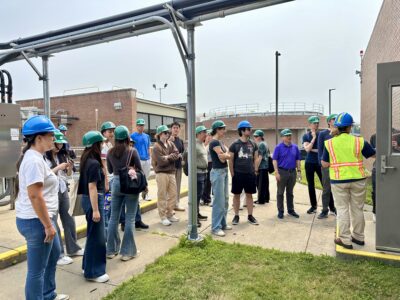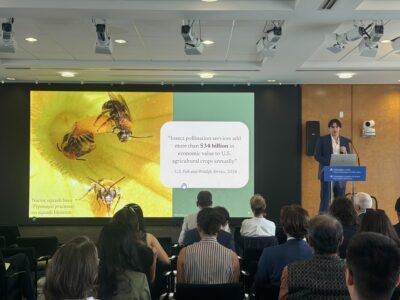
1. What drew you to the Master of Public Administration in Environmental Science and Policy program?
As an undergraduate, I doubled majored in environmental geology and political science, so I wanted a master’s program that would allow me to continue to solidify and expand my understanding of environmental science while also improving my understanding of the policy-making process. It was also important to me to continue to conduct research. After learning about the MPA ESP program, I found that it offered all of these things.
2. What were you doing before you started the program?
Before starting the program, I split my time between working at South Carolina NASA Space Grant Consortium as a program assistant, and at South Carolina NOAA Sea Grant Consortium, as a marine science education specialist. I really enjoyed both of my jobs because they allowed me to share my love of science with students of all ages (from kindergarten up to students in their senior year of college).
3. What area of environmental policy and management are you most interested in?
This is a tough question—is “everything” an acceptable answer? I suppose if I had to choose, I would say climate change and environmental justice.
I am particularly interested in climate change because it is a complex issue. It is complex not only because of the science behind it, but because it requires communication and cooperation between the social and physical sciences. I am also interested in issues of environmental injustice, because it is something that I have experienced in my childhood neighborhood. Thus, I want to stand up for communities like my own that are currently facing environmental injustices, and I want to do this while also educating and motivating these communities so that they have the knowledge and passion to stand up for themselves.
4. What skills and tools do you hope to acquire through the program?
I hope to refine my research skills, while subsequently acquiring skills that will allow me to become a successful leader within the environmental science/policy field. I also hope to improve my networking and communication skills.
5. What is your favorite class in the program so far, and why?
It is hard to choose one class, because I really enjoyed all of the science classes this summer—all of the professors are so knowledgeable, personable and engaging. The summer session definitely solidified my understanding of environmental science, while also providing me with opportunities to apply the science that we learned to policy.
6. How do you intend to utilize your degree to further your career?
I plan to use my degree to create positive social change—I want to inspire others to care about the Earth and the environment, and I want to educate others about the world around them…all the while making my own discoveries to provide long-lasting contributions to this field. Ultimately, I want to become the president of my own non-profit organization that will focus on STEM (science, technology, engineering and math) literacy for youth and adults around the world.
8. How did receiving a fellowship allow you to attend the program?
I was extremely fortunate to receive the Dean’s Environmental Policy and Science Fellowship, which provided me with a full tuition grant, and an internship within the Program on Sustainability Policy and Management. Receiving this fellowship provided me with the wherewithal to be a part of this program—this was especially important for me, because I am a financially disadvantaged, first-generation student. However, most importantly, receiving this fellowship has allowed me to pursue my dreams—more specifically, it allowed me to pursue my dreams at a prestigious university. In the future, I hope to inspire and encourage students whose situation is similar to mine to work hard and to keep their dreams and aspirations in sight, because it definitely pays off—it certainly did for me.



